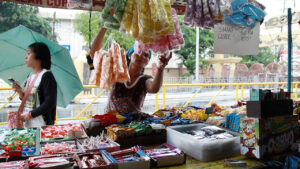PRICES of various goods sold in mom-and-pop outlets, known in the Philippines as sari-sari stores, continue to increase despite a decline in inflation, a study by tech startup Packworks found.
“Key findings include significant retail price increases across the board for items like baby oil and baby powder,” Packworks said in a statement.
In particular, it said that a 50-milliliter bottle of Johnson’s regular baby oil increased 17% to P49 in 2025 compared to 2023 levels.
It added that prices of 100-gram packs of Tender Care baby powder also rose 25% to P50.
“These price hikes were observed in at least five regions: Ilocos Region (Region I), Cagayan Valley (Region II), Central Luzon (Region III), Mimaropa (Region IV-B), and Bicol Region (Region V),” it added.
Packworks also found price increases of at least 13% in 11 confectionery and snack stock-keeping units.
These include 50-gram Lala Fish Crackers Classic, which saw a 27% increase to P23, and 150-gram Fres candy, which rose 16% to P42.
Price increases were also seen in premium rice, which rose to P295 per five-kilogram pack.
Packworks Chief Data Officer Andoy Montiel said the study reveals how a slight increase in the products’ wholesale purchase price affects end-consumer pricing.
“Sari-sari stores are known for their thin profit margins. While they operate as viable businesses, they also serve as extended pantries and community hubs for their neighbors,” he said.
“Even a slight increase in wholesale prices reveals how vulnerable micro-retailers are to cost shifts upstream. This creates a ripple effect, especially in low-income communities where these stores are the primary source of daily essentials,” he added.
According to Packworks, the price increases coincide with the declining inflation rate, which hit a low of 1.3% in May.
“Our latest analysis reveals gaps between national macroeconomic reports and the grassroots micro-retail reality,” Packworks Chief Executive Officer Bing Tan said.
“These insights can act as early indicators to inform distribution chains and policymakers of where support and aid are most needed,” he added. — Justine Irish D. Tabile

